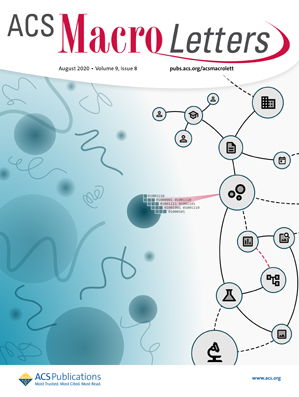有机碱催化的羧基炔咔嗒聚合
IF 5.1
Q1 POLYMER SCIENCE
引用次数: 0
摘要
聚酯在生物和工程领域有着广泛的应用。然而,缩聚反应需要较高的反应温度和较长的反应时间,而且开环聚合通常对官能团不耐受。因此,在温和的反应条件下开发新的聚合法将进一步促进聚酯的发展。在温和的反应条件下,我们建立了一种新的有机碱催化酯活化的炔烃和羧酸的咔嗒聚合反应,得到了质量平均分子量高达24200的区域和立体规则聚(β-酰基丙烯酸酯)s,收率高达96%。合成的聚合物具有多种特性。脂肪族聚(β-酰基丙烯酸酯)表现出结晶行为,而芳香聚合物表现出高的热稳定性。含四苯乙烯单元的聚合物表现出高折射率和abb本文章由计算机程序翻译,如有差异,请以英文原文为准。

Organobase-Catalyzed Carboxyl-yne Click Polymerization
Polyesters have been widely used in the biological and engineering fields. However, the polycondensations used require high reaction temperatures and long reaction times, and the ring-opening polymerizations are generally intolerant to functional groups. Therefore, the development of a new polymerization toward polyesters under mild reaction conditions will further promote their development. In this work, we established a new organobase-catalyzed click polymerization of ester-activated alkynes and bis(carboxylic acid)s under mild reaction conditions, and regio- and stereoregular poly(β-acyloxyacrylate)s with weight-average molecular weights up to 24200 were obtained in yields up to 96%. The resultant polymers show versatile properties. The aliphatic poly(β-acyloxyacrylate)s exhibit crystalline behavior, whereas the aromatic polymers demonstrate high thermal stability. The polymer containing tetraphenylethene units exhibits the trade-off of high refractive index and Abbé Number. Thanks to the dynamic nature of β-acyloxyacrylate units, the resultant polymers could be quickly degraded upon addition of phenol derivatives and organobase, which could be applied in the fabrication of fluorescent photopatterns. Thus, this work not only provides a powerful polymerization toward polyesters and a facile reaction for postmodification of the materials containing carbonyl groups, but also enriches the family of X-yne click polymerization.
求助全文
通过发布文献求助,成功后即可免费获取论文全文。
去求助
来源期刊
CiteScore
10.40
自引率
3.40%
发文量
209
审稿时长
1 months
期刊介绍:
ACS Macro Letters publishes research in all areas of contemporary soft matter science in which macromolecules play a key role, including nanotechnology, self-assembly, supramolecular chemistry, biomaterials, energy generation and storage, and renewable/sustainable materials. Submissions to ACS Macro Letters should justify clearly the rapid disclosure of the key elements of the study. The scope of the journal includes high-impact research of broad interest in all areas of polymer science and engineering, including cross-disciplinary research that interfaces with polymer science.
With the launch of ACS Macro Letters, all Communications that were formerly published in Macromolecules and Biomacromolecules will be published as Letters in ACS Macro Letters.

 求助内容:
求助内容: 应助结果提醒方式:
应助结果提醒方式:


